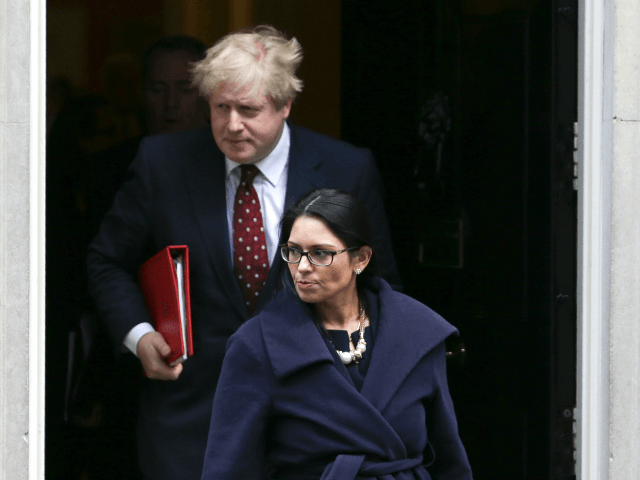The Migration Watch think tank and Brexit Party leader Nigel Farage have warned that a new Immigration Bill sold to the public as bringing migration under control could actually increase arrivals, by lowering barriers to entry.
“Our population has risen by over six million since 2001 and 80 per cent of that is down to immigration. I do not believe a rapidly rising population improves our quality of life,” Farage observed on his LBC Radio show.
Although Boris Johnson concerned migration sceptics early on by dropping a long-standing Tory promise — never kept — to reduce net immigration “from the hundreds of thousands to the tens of thousands” and flirting with an illegal migrant amnesty, much has been made of his new Immigration Bill, fronted by Home Secretary Priti Patel, and how it will, finally, get Britain out of the EU Free Movement of People regime.
The Immigration Bill has certainly been treated as if it would seal the national frontiers by Britain’s pro-open borders left — but migration sceptics such as Farage, wary of Johnson’s pro-immigration sensibilities, have noticed that it introduced a number of changes which could actually see migrant numbers rise.
“They’ve set the barriers for educational ability and income earning potential so low that actually numbers coming into the UK could increase, not decrease as a result of this and then we have to question their competence,” the Brexit Party leader warned.
He also highlighted the Home Office’s ongoing failure to stop illegal migrants crossing the English Channel from safe, first world France in record numbers as an ill omen, asking: “If Priti Patel can’t get a grip on what’s happening in the English Channel, how can we trust her to put a completely brand new immigration system into place?”
The respected Migration Watch UK think tank founded by Lord Green of Deddington has also raised substantial concerns with Breitbart London about the Immigration Bill in a press release and further explanatory comments.
“The government have acknowledged what we have been saying for months – their immigration proposals may well drive an increase in immigration,” they said, in reference to official research which indicates that the Immigration Bill “could lead to non-EU worker numbers (along with their dependants) going up by between 25,000-50,000 per year and students numbers going up (net) by 20,000-25,000 per year.”
The research is also clear that the new policies may “offer greater opportunities to employers looking to source skilled labour from outside the UK and EEA” — while dropping the already not particularly rigorous requirement for bosses to try and recruit British workers before seeking cheap foreign labour.
“This is absolutely not the time to be opening six million jobs to new or increased international competition,” commented Migration Watch chairman Alp Mehment, in reference to the mass unemployment caused by the Chinese coronavirus pandemic.
“It is simply wrong that jobs should no longer have to be advertised in the UK before being opened up to recruits from around the globe,” he added.
“Ministers and MPs must remember that, following the 2008 financial crisis, it took six years for the number of UK-born workers to regain its pre-crash level, while the number of workers born abroad increased by more than a million as employers sought out cheaper overseas labour,” the think tank noted in its press release, stressing the importance of ensuring this pattern is not repeated post-coronavirus.
Migration Watch also highlighted multiple “new avenues” for migrants which the Immigration Bill will create to Breitbart London, including opportunities for foreign workers to take medium-skilled roles “at a lower salary, with no cap and no resident labour market test” and opportunities for foreign students to stay on for two years after graduation.
“Don’t be fooled by the government’s proposed Immigration Bill,” cautioned Ben Harris-Quinney, who leads the conservative Bow Group think tank, in a separate warning.
“It LOWERS the earning threshold for immigrants by £10,000 [and] sets no limit or cap target on immigration (previously 99,000 net). It won’t reduce immigration.”
Nevertheless, the bill passed its second reading in the House of Commons last night.

COMMENTS
Please let us know if you're having issues with commenting.